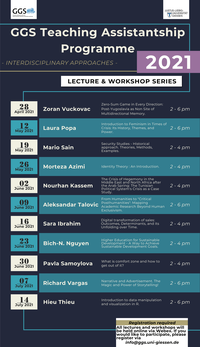**postponed - more information soon** [Online] GGS Teaching Assistantship Programme: Introduction to Feminism in Times of Crisis: Its History, Themes, and Power
- https://www.uni-giessen.de/de/fbz/zentren/ggs/veranstaltungen/index_html/sose2021/workshop_popa
- **postponed - more information soon** [Online] GGS Teaching Assistantship Programme: Introduction to Feminism in Times of Crisis: Its History, Themes, and Power
- 2021-05-12T14:00:00+02:00
- 2021-05-12T18:00:00+02:00
12.05.2021 von 14:00 bis 18:00 (Europe/Berlin / UTC200)
Online via Webex
Feel free to join the lecture and workshop series of the Teaching Assistantship Programme 2021
| WORKSHOP |
|
|
|
Lecturer: | Laura Popa | |
|---|---|---|
| Date: | May 12, 2021, 2.00 pm to 6.00 pm | |
| Application deadline: | May 2, 2021 |
**The workshop is postponed due to illness. More information soon**
This workshop is part of the GGS Teaching Assistantship Programme 2021.
Content
Teaching concept
“Never forget that a political, economic or religious crisis will be enough to cast doubt on women's rights. These rights will never be vested. You'll have to stay vigilant your whole life.”
Simone de Beauvoir, The Second Sex
Simone de Beauvoir’s ‘prophetic’ words from 1949 still echo in 2021. The current COVID-19 crisis shows an increased return to inequality and the relegation of women to the private sphere. Women’s rights are at stake once again. Many women have quit their jobs to take care of children. Others face daily domestic and sexual violence because forced at home into prolonged lockdown with the aggressors, to name a few threats. In this context, rather than addressing questions such as who needs feminism, what to do seems more urgent. In order to provide tools to stop these negative shifts in women’s emancipation, this 4-hour workshop aims to address feminism both as a historical and as a daily-life practice. On one hand, the goal is to deliver basic knowledge about the history of feminism through feminist classics from politics, literature, and arts. On the other hand, its action-oriented aim is to raise awareness, discuss, and find solutions. In doing so, the workshop starts with the instructor’s input about the recommended readings written by feminists Olympe de Gouges (1791), Elizabeth Cady Stanton and Lucretia Mott (1848), Sojourner Truth (1851), Simone de Beauvoir (1949), and Betty Friedan (1963). The instructor will circulate the readings in advance. Then, time will be allocated to the visualization of scenes from feminist movies Thelma and Louise (1991) and Mona Lisa Smile (2003). Discussions of both texts and films will take place through the first part of the workshop. In the last part, the instructor will present the global experience of women during this pandemic as shown in statistics and articles, followed by discussions and the feminist practice of consciousness-raising.
Therefore, this workshop seeks to situate historically feminism in Western Europe and the United States. Starts with the French Revolution, passes through the nineteenth and twentieth centuries to present times with the so-called first, second, and third wave-feminism. It discusses its major themes and explores its power to fight inequality in 2021. Thus, the seminar aspires to both scholarly and problem-solving reflection. At the end of this session, the participants will have gained historical knowledge about what feminism is, the types, the complexity of major themes, and why feminism is still relevant. Ideally, through the consciousness-raising tactic from second-wave feminism, they will witness empowerment and a sense of personal responsibility in solving inequality, personally, locally, and globally.
Detailed Schedule
1. ‘Historical’ part (2 hours with 15 minutes break)
- Welcome and round of introductions
- Brief input: historical contexts of the recommended readings
- Small group and plenary discussions of texts with the help of ‘guiding’ questions
- Watching movie scenes from Thelma and Louise and Mona Lisa Smile
- Small group and plenary discussions of sequences with the help of ‘guiding’ questions
2. ‘Activist’ part: consciousness-raising (2 hours with 15 minutes break)
- Brief input: reports about women and COVID-19
- Small group and plenary discussions with the help of ‘guiding’ questions
- Participants share one specific episode of inequality in which they have been the target or have witnessed someone else’s discrimination
- Brainstorming about theories and actions that might be of help
- Problem-solving from participants’ experiences and ways to implement in their daily life and local communities, be they of the Faculties of Law, Economics and Business Studies, and Social Sciences, Cultural Studies, and others at JLU Giessen
Further information is available in the syllabus "Introduction to Feminism in Times of Crisis: Its History, Themes, and Power".

